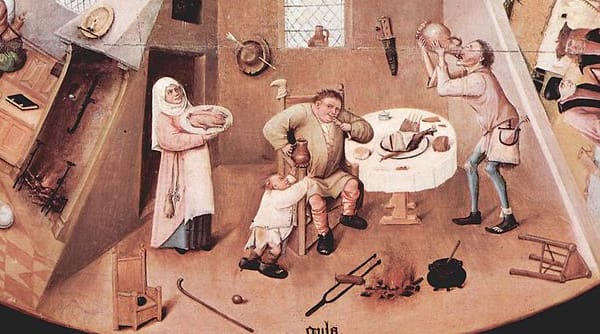In the Gospel Jesus set forth the need to accept the crosses of our lives and carry them. Crosses are not merely the big sufferings in life such as disease, the death of a loved one, the loss of a job, and so forth. There are also the daily crosses of self-discipline, hard work, obedience, setbacks, consequences for our decisions, limits to what we can do, and the cross of resisting temptation.
Opposed to this teaching from the Lord is hedonism. Most people today link hedonism with sexual excess and perhaps drinking. But Hedonism is a far wider notion and it is why St. Paul said: We preach Christ crucified: a stumbling block to Jews and foolishness to Gentiles (1 For 1:23). To the Jews, Christ crucified was a stumbling block since they believed that anyone hung from a tree was cursed by God (see Deut 21:23). But to the Greeks and Romans, the cross was an absurdity due to the widespread philosophy of hedonism among them. So what is hedonism?
Hedonism is the doctrine that pleasure or happiness is the sole or chief good in life. It comes from the Greek word h?don?, meaning “pleasure” and is akin to the Greek h?dys, meaning “sweet.”
Of course pleasure is to be desired and to some degree sought, but it is not the only good in life. Indeed, some of our greatest goods and accomplishments require sacrifice: years of study and preparation for a career; the blood, sweat, and tears of raising children.
Hedonism seeks to avoid sacrifice and suffering at all costs. It is directly opposed to the theology of the Cross. St. Paul spoke in his day of the enemies of the cross of Christ. Their end is destruction, their god is the belly, and they glory in their shame, with minds set on earthly things (Php 3:18–19). As noted, he also taught that the cross was an absurdity to the Gentiles (1 Cor 1:23).
Things have not changed, my friends. The world reacts with great indignation whenever the cross or suffering is even implied. So the world will cry out with bewildered exasperation and ask incredulously of the Church, are you saying that a woman who was raped must carry the child to term and cannot abort? Yes, we are. Are you saying that a “gay” person must live celibately and may never “marry” his or her same-sex lover? Yes, we are. Are you saying that a handicapped child in the womb must be “condemned” to live in the world and cannot be aborted and put out of his (more accurately our) “misery”? Yes, we are. Are you saying that a suffering person cannot be euthanized to avoid the pain? Yes, we are.
The shock expressed in these sorts of questions shows how deeply hedonism has infected the modern mind. The concept of the cross is not only absurd, it is downright “immoral” in the hedonist mentality, which sees pleasure as the only true human good. To the hedonist, a life without enough pleasure is a life not worth living, and anyone who would seek to set limits on the lawful (and sometimes unlawful) pleasures of others is mean, hateful, absurd, obtuse, intolerant, and just plain evil.
When pleasure is life’s only goal or good, how dare you, or the Church, or anyone seek to set limits on it let alone suggest that the way of the cross is better or required! You must be banished, silenced, and destroyed.
Many faithful Catholics in the pews are deeply infected with the illusion of hedonism and thus take up the voice of bewilderment, anger, and scoffing whenever the Church points to the cross and insists on self-denial, sacrifice, and doing the right thing even when the cost is great. The head wagging in congregations is often visible if a priest dares to preach that abortion, euthanasia, in vitro fertilization, and contraception are wrong regardless of the cost, or if he speaks about the reality of the cross. The faithful who swim in the waters of a hedonistic culture are often shocked at anything that might limit the pleasure that others want to pursue.
Hedonism makes the central Christian mysteries of the cross and redemptive suffering seem like something from a distant planet or a parallel and strange universe. The opening word from Jesus’ mouth, “Repent,” seems strange to the hedonistic world, which has even reconstructed Jesus Himself to be someone who just wants us to be happy and content. The cry goes up, even among the faithful, doesn’t God want me to be happy? On this basis, all kinds of sinful behavior is supposed to be tolerated because insisting on the opposite is “hard” and because it seems “mean” to speak of the cross or of self-discipline in a hedonistic culture.
Bringing people back to the real Jesus and to the real message of the Gospel, which features the cross as the way to glory, takes a lot of work and a long conversation. We must be prepared to engage in that extended conversation with people.
image credit: Hieronymus Bosch / Public domain
Post originally appeared in Community in Mission, used with permission.




